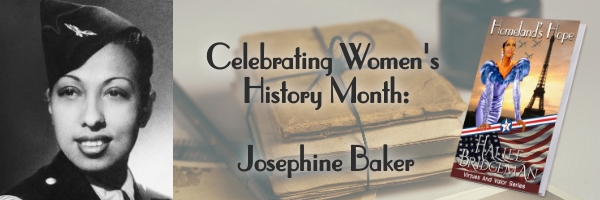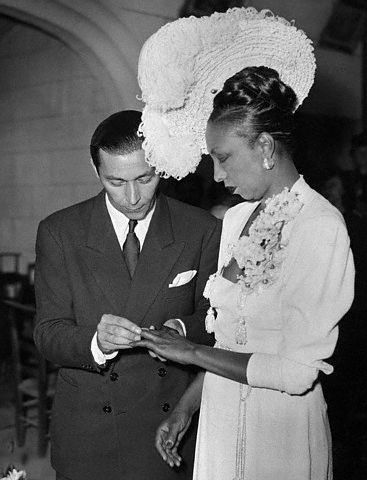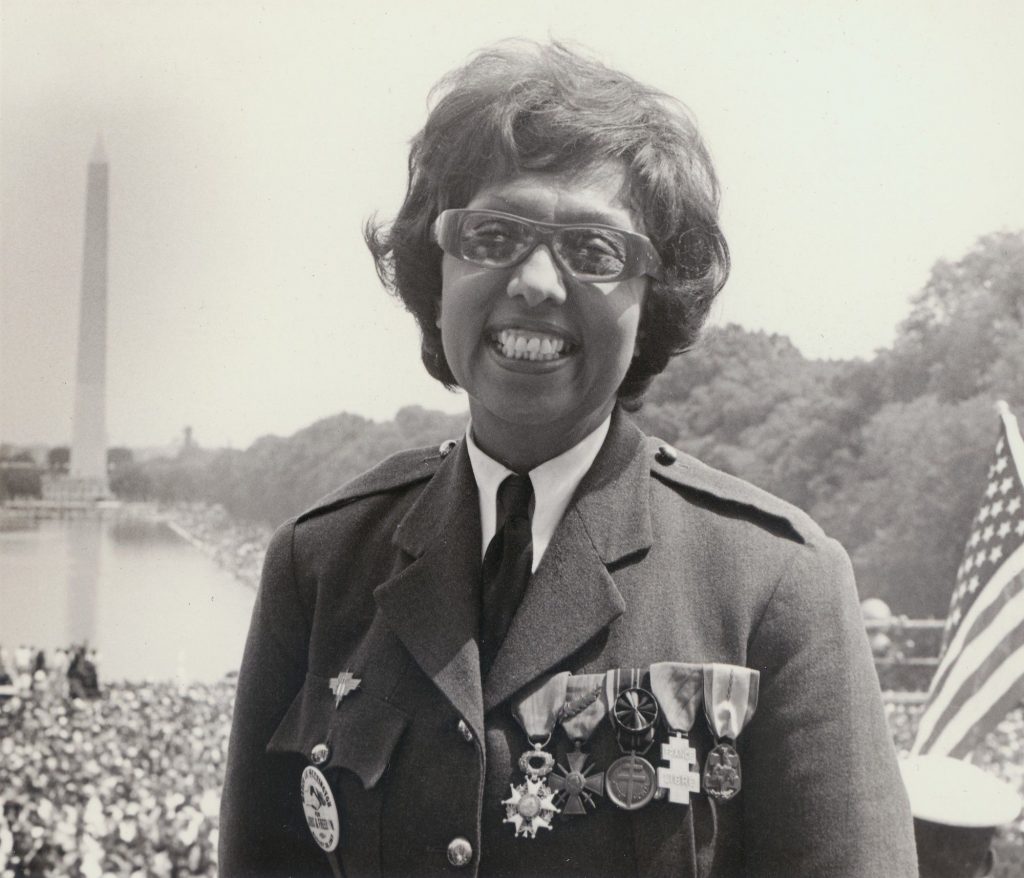
While the story of the special team of operators named The Virtues is entirely fictional, set in a fictional town, and comprised of fictional characters who form a fictional military division, every single one of my fictional heavenly heroines was inspired by a real World War II heroine, and the story was inspired by real events.
The fictional character Virginia Benoit was inspired by the very real heroine Josephine Baker.
Born into poverty in St. Louis, Missouri, in 1906 as Freda Josephine McDonald, she would later be known to the world as Josephine Baker. Her courageous actions during the Second World War are less well known even to this day.
Despite her dire childhood circumstances, she loved dancing and learned how by watching and mimicking the dancers at the Booker T. Washington Theater. At the age of ten, she won a dance competition and decided on the spot she wanted to be a dancer when she grew up.
In 1917 she witnessed the St. Louis race riots and the “black exodus” that followed. The image of a sea of frightened people fleeing the murderous riot behind them as they crossed the St. Louis Bridge toward her was forever etched in her mind. What she saw in those days spurred her heart to spend much of her adult life confronting and fighting the evil we call racism.
In 1925, after spending much of her career dancing in New York City, Josephine went to Paris to perform in La Revue Nègre at the Théâtre des Champs-Elysées. Paris loved Josephine Baker, and she loved Paris. Soon, she was among the highest-paid entertainers in France of any race, a stage and movie sensation. She came to be known in various circles as the “Black Pearl,” the “Bronze Venus” and even the “Creole Goddess.”
In 1928, Josephine went on a European tour and witnessed how racist much of Europe was becoming. Nazi-run newspapers condemned her for performing on the same stage as “Aryan” performers, and some places even threw ammonia bombs at her. After that, Josephine correctly equated racism and religious intolerance with Nazism.
In 1934, Josephine took the starring role in a French film, Zuzu, a great success in Paris. The name Zuzu comes from Zuzana, a Czech/Slovak form of Susana, but for whatever reason, it stuck, and Josephine’s close friends often called her Zuzu in private and in letters after the film’s release.

In 1936, the same year Jesse Owens won four Olympic gold medals in Berlin, Josephine returned to America to perform, but was treated with open racism and general hostility. Heartbroken by the way her home country had treated her, she returned to France. Baker returned to Paris in 1937, married Frenchman Jean Lion, who was Jewish, and became a French citizen.
On November 9, 1938, Nazis in Germany destroyed Jewish homes, synagogues, and businesses in what is today called Kristallnacht, the “Night of Broken Glass.” Shortly afterward, Josephine joined the International League against Racism and Anti-Semitism.
An organization in France called Deuzieme Bureau sought undercover agents who could afford to work without pay and also travel without suspicion. They approached Josephine and asked her to be an agent for them. Without hesitation, Josephine embraced the opportunity. After several weeks of training in weapons, self-defense, and memory techniques, she accepted her first mission: attending parties at the Italian embassy and reporting any useful information she overheard.
Her chateau, a large rural home in southern France she had named Les Milandes, became a stopping-point for Resistance workers, a safe house for refugees, and was occasionally used to store weapons. Eventually, the Germans grew suspicious and started watching her home, and she left. She traveled through Spain, Portugal, and North Africa, performing, attending parties, and listening. Just like the fictional Virginia Benoit, the real Josephine Baker used invisible ink and wrote what she saw and heard in the margins of her sheet music.
In June 1941, Josephine became very ill and was hospitalized in Casablanca until December 1942. When she was finally released and strong enough to perform, she performed for the Allied troops for the first time, insisting that the audience, which was traditionally seated with black soldiers in the back, be desegregated before she performed.
After the war, the government of France awarded Josephine the Ordre national de la Légion d’Honneur, or the National Order of the Legion of Honor, with the rosette of the Resistance, and became the first American born woman ever to receive the Croix de Guerre. These are two of France’s highest military honors.
When the war ended, Josephine returned to her chateau, Les Milandes. In 1947, she married again, this time to French orchestra leader Jo Bouillon. She adopted twelve children, all of different nationalities, which she referred to as her “rainbow tribe”. Her intent was to impress upon the outside world that people of different colors and ethnicities could live together as a family.
The “incident” with the radio personality which fictional characters Radden and Benoit stage is based on an actual event that occurred in New York’s Stork Club long after the war on the night of October 16, 1951. To set the record straight more than half a century later, by all accounts, the radio personality on the other end of the rhubarb, Walter Winchell, was utterly innocent of any wrong-doing. He was simply also present when the incident occurred.
The blame for the mistreatment Josephine Baker suffered should have fallen squarely and fairly upon the shoulders of Stork Club owner, Sherman Billingsley. The problem was that no one in 1951 had ever heard of Billingsley while absolutely every “Mr. and Mrs. America from border to border and coast to coast and all the ships at sea” knew the name of Walter Winchell. Without a hint of exaggeration, more than half of the population of the United States read his columns and listened to his weekly radio show.
Ironically, Winchell was not only Jewish and a former vaudevillian himself, he also strongly supported civil rights. He stridently denounced Hitler and the Nazi party long before the attack on Pearl Harbor. He publicly outed anti-Semites like Charles Lindbergh and Nazi sympathizers like Fritz Kuhn. Logically, Winchell and Baker should have gotten along well, though the rift between them remained throughout their lifetimes.
Josephine continued to perform her own show at the Roxy to sold-out crowds throughout the remainder of the season, though the Stork Club incident continued to haunt her career in the United States from that day forward. Despite the bad press, Baker took several trips back and forth to America in the 1950s and 1960s to help with the growing Civil Rights Movement.

Josephine Baker wore her many medals and spoke immediately before Dr. King’s famous “I have a dream” speech.
On August 28, 1963, two separate parades held for male and female civil rights leaders culminated in the famous March on Washington. The men marched down Pennsylvania Avenue. The women—including Josephine Baker, Daisy Bates, and Rosa Parks—marched down Independence Avenue. When the groups met at the Mall, on the platform, Josephine stood right beside Dr. Martin Luther King, Jr., and was the only female speaker at the march preceding the famous “I Have a Dream” speech by Reverend King. She had passed her fifty-seventh birthday two months earlier.
Whenever she performed in America, she insisted on a nonsegregation clause in her contracts. Most places honored them, resulting in desegregation in clubs that otherwise never would have happened. The NAACP eventually named May twentieth “Josephine Baker Day” in honor of her lifelong efforts to end racism.
In 1973, Josephine performed at Carnegie Hall where she was received with a standing ovation. Two years later, she performed at the Bobino Theater in Paris to celebrate the fiftieth anniversary of her Paris debut. Celebrities in attendance included Sophia Loren and Princess Grace of Monaco. Just days later, on April 12, 1975, Josephine Baker died in her sleep at the age of 69.
An estimated 20,000 people lined the streets for her funeral procession. Josephine Baker became the first American in history to receive full military honors in a French funeral.
Read about Virginia Benoit, my character inspired by the story of Josephine Baker in Homeland’s Hope, part 2 of the Virtues and Valor series!
Homeland’s Hope

Stage and screen legend VIRGINIA BENOIT performs for standing room only crowds in her adopted home of France. When the Nazis roll into Paris, she flees to Casablanca, taking the heart of a enemy General with her. While in there, Virginia devises a plan to use her position, talent, and influence with the high ranking Axis officer to aid the Allied cause.
Save $0.50 by clicking the button below to order this book directly from Hallee. Otherwise, click the "order now" button to buy it from your favorite retailer.


















